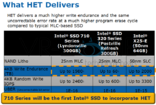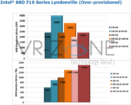Monday, September 5th 2011

Intel Readies SSD 710 Series for the Enterprise Market
In the weeks to come, Intel will unveil a new family of solid state drives, the SSD 710 series, codenamed "Lyndonville". These come in the 2.5-inch form-factor, and use the 3 Gb/s SATA interface. Intel is pitching SSD 710 series to the enterprise computing segment, as a potential successor of even the X25-E series. Its design principles include giving the enterprise segment an SSD with lower price per gigabyte and endurance comparable to X25-E. Intel is able to achieve lower price per gigabyte because it is using High Endurance Technology Multi-Level Cell (HET-MLC) NAND flash memory chips built on the 25 nanometer fabrication proces, and not 50 nm SLC NAND flash.
Intel's SSD 710 series are available in three capacities - 100 GB, 200 GB, and 300 GB. The endurance rating, 4 KB and 8 KB random read/write performance, and even sequential transfer rates vary between the three. Endurance and performance are also affected by overprovisioning. The drives can be set provide its maximum advertised unformatted capacity, or 20% of it can be overprovisioned. The SSD 710 drives provide up to 1,500 TB 4 KB random write endurance, and up to 2,400 IOPS 4 KB random write performance.In terms of sequential transfer rates, the three SSD 710 models offer 270 MB/s sequential read speed. The 100 GB variant sequentially writes at speeds of up to 170 MB/s, while the 200 GB and 300 GB ones sequentially write at up to 210 MB/s. In terms of 4 KB write endurance, the 100 GB model offers 500 TB (900 TB with 20% overprovisioning), the 200 GB model offers 1000 TB endurance (1500 PB with 20% overprovisioning), while the 300 GB model tops the charts with 1100 TB endurance (3000 TB with 20% overprovisioning). What it means for datacenters and hosting companies is that they can offer higher capacity of SSD storage on their leased servers. Intel's SSD 710 series will be released by mid-September.
Source:
VR-Zone
Intel's SSD 710 series are available in three capacities - 100 GB, 200 GB, and 300 GB. The endurance rating, 4 KB and 8 KB random read/write performance, and even sequential transfer rates vary between the three. Endurance and performance are also affected by overprovisioning. The drives can be set provide its maximum advertised unformatted capacity, or 20% of it can be overprovisioned. The SSD 710 drives provide up to 1,500 TB 4 KB random write endurance, and up to 2,400 IOPS 4 KB random write performance.In terms of sequential transfer rates, the three SSD 710 models offer 270 MB/s sequential read speed. The 100 GB variant sequentially writes at speeds of up to 170 MB/s, while the 200 GB and 300 GB ones sequentially write at up to 210 MB/s. In terms of 4 KB write endurance, the 100 GB model offers 500 TB (900 TB with 20% overprovisioning), the 200 GB model offers 1000 TB endurance (1500 PB with 20% overprovisioning), while the 300 GB model tops the charts with 1100 TB endurance (3000 TB with 20% overprovisioning). What it means for datacenters and hosting companies is that they can offer higher capacity of SSD storage on their leased servers. Intel's SSD 710 series will be released by mid-September.



4 Comments on Intel Readies SSD 710 Series for the Enterprise Market
PS: what you are looking at is coming from an X25-E in TPU's DB server :)